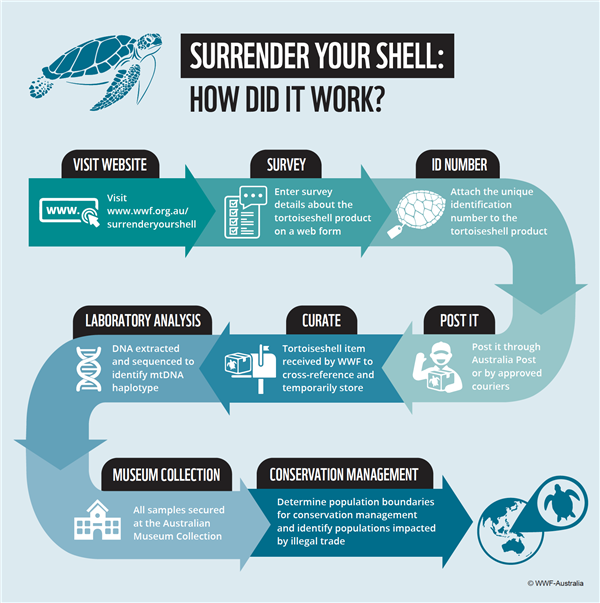Surrender Your Shell is a joint conservation project between WWF-Australia and the Australian Museum, supported by Royal Caribbean International.
Thank you for your support
An estimated 9 million hawksbills were harvested between 1844 and 1992 with their beautiful shell supplying the tortoiseshell industry. The groundbreaking Surrender Your Shell is helping to protect today's Critically Endangered hawskbill turtles from poaching.
There were 328 tortoiseshell products, including salad servers, hairpins, necklaces, bracelets and even bookmarks, donated to the project by members of the public, wildlife trade monitoring network TRAFFIC and the Federal Government.
Cutting edge technology was then used to extract DNA from the surrendered tortoiseshell items and traced them back to specific turtle populations from all over the world.
How does this work? Hawksbill turtles from different regions are genetically distinct and when their DNA is added to our ShellBank database through donated items, it enables us to identify where the most at-risk and targeted hawksbill turtles populations are.

Results showed the donated items were originally purchased from hotspots all over the world, including Italy, the Bahamas, St. Lucia, Puerto Rico, Bolivia, South Pacific islands, Fiji, Solomon Islands, Australia, South Africa, the Maldives Thailand, Vietnam, Timor Leste, Papua New Guinea, Indonesia, and Hong Kong.
The DNA was then checked against ShellBank. Of the 62 hawksbill products successfully sequenced, DNA indicated 3.2% were likely from Japan (foraging area not nesting beaches), 3.2% Caribbean, 8.1% Eastern Malaysia, 11.3% unknown, 24.2% Southwest Pacific, and 50% had genetic variants common across the Indian and Pacific oceans.
Identifying these high-poaching locations will help inform future conservation efforts for hawksbill turtles by informing authorities where policing and intervention is needed most.